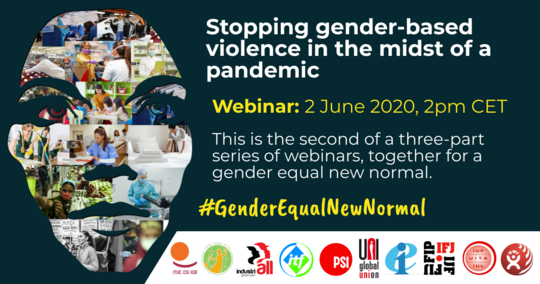Covid 19 is not gender neutral, and everywhere women have been impacted disproportionately by lockdown measures. Stories and data collected, from Australia to Swaziland, point to the need for stronger policy intervention and implementation of key instruments including ILO Convention 190 and Recommendation 206. Unions across the world are developing new tools to protect women from violence, discrimination, and from the virus itself.
Women are overrepresented in essential and yet undervalued sectors such as cleaning, grocery stores, domestic work and make up the majority of front-line health workers. Swaziland Democratic Nurses Union chairperson Irene Khumalo emphasized that too many women are currently trapped between their frontline role in dealing with the pandemic and their own right to protection.
Even though essential, women frontline workers are too often devalued: they are considered as less worthy of protection than doctors, and are denied basic equipment and sanitizer. Often harassed in the workplace, "women have been asked for sexual favors in exchange of disinfectant gel", Khumalo said.
As people resorted to panic-buying in supermarkets, women working in shops and grocery stores have repeatedly been attacked, insulted, and harassed. Julia Fox, National Assistant Secretary of the SDA, the Australian union for workers in retail, fast food and warehousing, said women normally suffer from customer abuse and violence at least once (88%) or weekly (25%) , while most of these events remain unreported, because of the customer-is-always-right logic and the fear of employers. The extreme conditions of the lockdown have only made this sad reality worse. “We initiated a 10-point safety plan to ensure adequate steps to protect workers, including increased security due to incidents of customer abuse & harassment. This plan was adopted by all businesses in the sector” Julia Fox stated.
Too many women workers cannot find relief from abuse at work in the home, where women are increasingly subjected to physical and emotional violence by their partners or relatives, or overburdened by domestic work. In these conditions, it is impossible for them to find a safe space.
Moderator Marie Clarke Walker from the Canadian Labour Congress emphasized: “Women need to be at the table to negotiate a post-Covid recovery. We can’t go back to normal. There is no ending to violence against women. What we want and must demand right now is protection from employers and from the state, measures for safety during and after this crisis, and union organization."
The webinar was part of a series of 3 discussions organised by Global Unions, including the IFJ, to address the effects of the Covid pandemic on women workers. The first one addressed Women Workers in the Front Lines. The last one will be held on 15 June and will be followed by the adoption of recommendations.
Speakers to the 2nd webinar included Irene Khumalo (PSI), Julia Fox (UNI), Fish Ip (IDWF), Sheela Naikwade (ITF)
Find out more about initiatives launched by unions to protect women workers from gender-based violence.
Find out how ILO Convention 190 can affect women journalists positively.
Follow: #GenderEqualNewNormal, #RatifyC190

